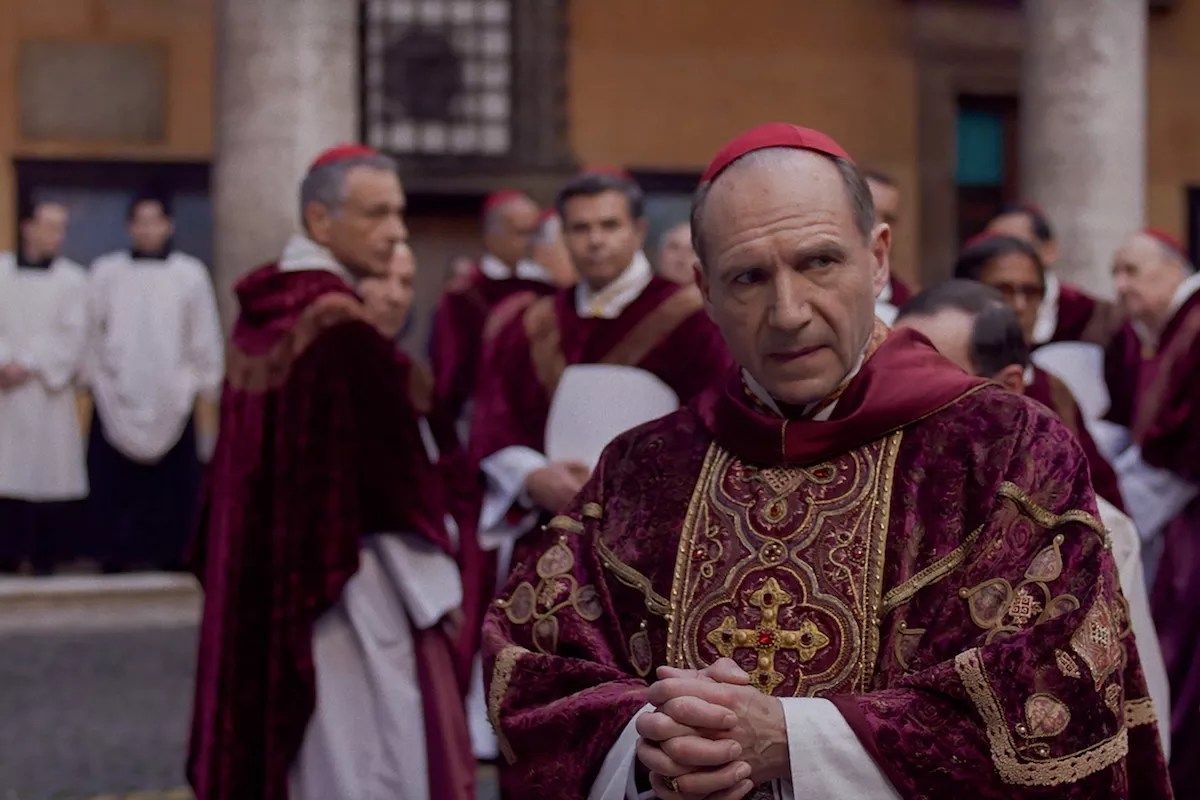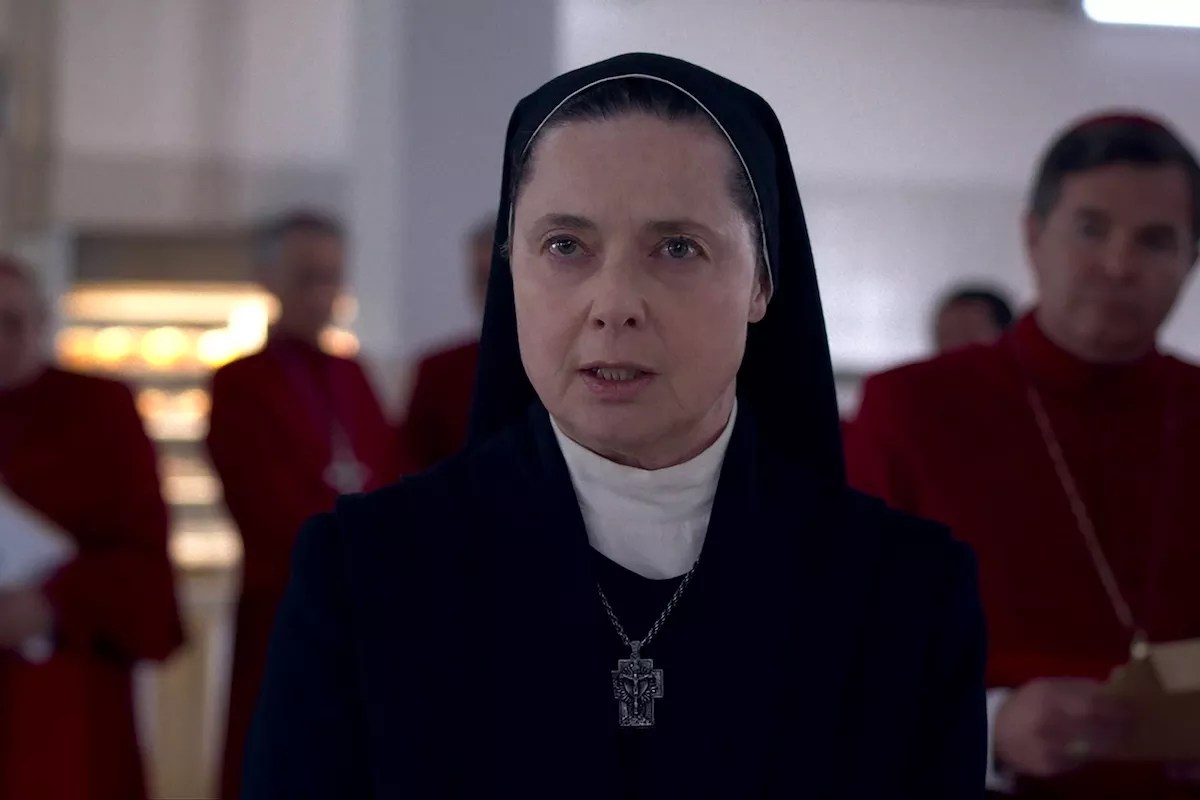
Focus Features photo

Audio By Carbonatix
The premise is simple: The pope has died, and the cardinals of the Holy See must convene to pick a new one. Everything else is much more complicated.
Peering behind the Vatican walls at the world’s most secretive election only weeks before the world’s most high-profile and consequential one, Conclave is a timely political thriller set in an ancient institution where secrets are wielded as weapons. All of the cardinals have their own agendas and ambitions. All dream of taking on the papal title, even when they insist they don’t seek the throne. At the center of it all is Lawrence (Ralph Fiennes), the dean of the College of Cardinals. He leads an inner circle of liberal bishops dedicated to stopping Tedesco (Sergio Castellitto), a flamboyant, racist reactionary in the mold of Trump and the other right-wing politicians.
Lawrence, who tried to leave the church over a crisis of faith, is charged with presiding over the conclave to elect the new pope while attempting to unravel the mysteries left behind by the old one. A cardinal reports that the stodgy American bishop Tremblay (John Lithgow), himself in the running, was fired by the pope in his final hours and that he died before anyone else could be alerted. Another leads the election before a sexual affair derails his candidacy. And then there’s the dark horse Benitez (Carlos Diehz), a conflict-zone missionary who was secretly declared Archbishop of Kabul. All this occurs behind closed doors, as the cardinals are not allowed any contact with the outside world that might influence their decision-making. Yet as scandals mount and violence on the outside in Rome threatens to intrude on the sacred rite, Lawrence’s hand-picked candidate, the liberal Bellini (Stanley Tucci), falters in the polls, leaving the dean no choice but to brave his own self-doubt and push for himself as the papal successor.

Isabella Rossellini in Conclave
Focus Features photo
Fiennes is magnetic as Lawrence, transmitting the man’s inner turmoil with astonishing ease. We see the tension and stress on his face in close-ups as he struggles to balance the responsibility of running the conclave impartially with his sense of duty to the church. He also has his grief to contend with – one moment alone in the pope’s chambers sees him break his grim facade and burst into tears, inconsolable at the death of his close friend. The entire cast is formidable, particularly Isabella Rossellini as Sister Agnes, the chief nun who allies with Lawrence in order to bring down the more corrupt candidates. She flits around in the background, delivering crucial information and speaking up only when imperative, yet she fills her small part so well that she leaves you wanting more.
The actors are just one part of what makes Conclave a very classy, watchable thriller, albeit one that might be a little conventional. Director Edward Berger, who led the German-language 2022 adaptation of All Quiet on the Western Front, fills the movie with sumptuous shots that remind us it’s impossible to make the Vatican look bad, aesthetically at least. In one early scene, the camera spins around Lawrence in the Sistine Chapel, putting us in his frazzled mind as he makes plans for the conclave. We get more striking pillow shots of the preparations: office phones disconnected in a pile on the ground, a trio of bishops smoking.
Berger certainly puts the focus on procedure. He values movement, lingering on the cardinals, strolling to place their ballots in the special bowl, or writing simultaneously after hearing birdsong from an open window, almost as if God is commanding them. One aerial shot shows the cardinals marching through the rain in slow motion, their white umbrellas and red frocks bold against the grey cobblestones. He’s more fascinated with the church’s rituals than the characters or their motivations. We don’t get the kind of ruminations on the nature of faith that carried, for instance, the conclave scenes in Sorrentino’s The New Pope, in which we hear the cardinals muse anxiously in prayer about the kind of pontiff they desire.

John Lithgow in Conclave
Focus Features photo
A lack of those kinds of theological discussions in Conclave makes the film feel a bit hollow when it comes to its political messaging. This is a film where the good priests are liberals who are permissible toward issues like divorce and LGBTQ people in Catholicism, the bad ones are raging bigots who call Muslims animals and sneer at their African colleagues, and the rest are varying levels of corrupt and self-interested. The film’s analogy of substituting our political system for that of the Vatican could not be more obvious. Yet, it’s somewhat incompatible, considering the intricacies of the organization and its public profile. The movie doesn’t explain why they might take certain viewpoints or feature any discussion over them; for instance, characters mostly state what they think and move on. Faith relies on these sorts of debates and reasonings over philosophy and religious practice, and failing to engage with them makes the film feel less full. It would be useful context to know why, for instance, the church finds the idea of women in the clergy so difficult to broach.
One particular plot twist in this vein may also come to define the film. At the very end, after a new pope has finally been elected – an unexpected one that astute viewers could have seen coming as soon as the character was introduced – Lawrence discovers perhaps the most shocking secret yet, one that in a less conservative polity would not factor. Ultimately, it shows that Conclave is not about Catholicism or the papacy. It’s about what we look for in a leader and what flaws we should overlook to achieve a more perfect world. After all, only God can be perfect.
Conclave. Starring Ralph Fiennes, Stanley Tucci, John Lithgow, and Isabella Rossellini. Directed by Edward Berger. Written by Peter Straughan and Robert Harris. 120 minutes. Rated PG. Opens Friday, October 22; check for showtimes at miaminewtimes.com/miami/movietimes.